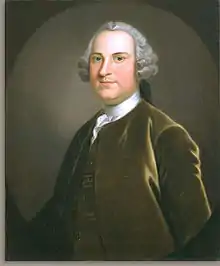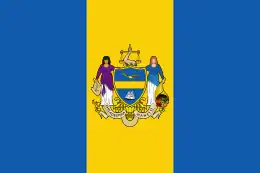Charles Willing
Charles Willing (May 18, 1710 – November 30, 1754) was an English-born merchant and politician who twice served as the mayor of Philadelphia, from 1748 until 1749 and again in 1754.[1]
Charles Willing | |
|---|---|
 | |
| Mayor of Philadelphia | |
| In office 1748–1749 | |
| Preceded by | William Attwood |
| Succeeded by | Thomas Lawrence |
| In office 1754–1754 | |
| Preceded by | Thomas Lawrence |
| Succeeded by | William Plumsted |
| Personal details | |
| Born | May 18, 1710 Bristol, Somerset |
| Died | November 30, 1754 (aged 44) Philadelphia, Pennsylvania |
| Resting place | Christ Church Burial Ground |
| Spouse |
Anne Shippen (m. 1731) |
| Children | 11, including Thomas, James and Mary |
| Parent(s) | Thomas Willing Anne Harrison |
| Occupation | Merchant, politician |
Early life
Charles Willing was born in Bristol, Somerset on May 18, 1710, the son of Thomas Willing and Anne Harrison. He traveled to the Thirteen Colonies by ship and settled in Philadelphia in 1728 at the age of eighteen. His cousin, Thomas Willing, was selling land and laying out plans for a new community called Willingtown, which later became Wilmington, Delaware. While living in Willingtown, Willing became a very successful businessman and held political offices such as councilman and magistrate.[2]
Philadelphia
Later in life, Willing moved to Philadelphia. In 1743, he was elected to the Common Council. In 1745, he was appointed as Justice. Then, in 1747, Willing was appointed as one of the Justices of the City Court. The following year in 1748 he was elected as the City Mayor. While serving as mayor Willing was subsequently appointed Justice in the years 1749, 1752 and 1754. Willing was a founder and trustee of the Academy and College of Philadelphia (now the University of Pennsylvania).[3] Willing was elected to serve a second term as mayor and during this time contracted ships fever and died on November 30, 1754.[4][5]
Legacy
His wife's grandfather, Edward Shippen, and his eldest son, Thomas Willing, also served as mayors of Philadelphia. Thomas was also a Delegate to the Continental Congress from Pennsylvania. His son James Willing was a representative of the American Continental Congress and led a military expedition during the American War of Independence known as the Willing Expedition.[6]
Career
Robert Morris apprenticed at the firm of Willing & Co., and later became a partner with Thomas in the renamed firm of Willing Morris & Co.[7]
Personal life
He married Anne Nancy Shippen (1710–1791) in 1731, daughter of Abigail Grosse (1677–1716) and Joseph Shippen (1678–1741), together they had eleven children, including:

- Thomas Willing (1731–1821), who married Anne McCall (1745–1781), daughter of Samuel McCall (1721–1762)
- James Willing (1750–1801)
- Mary Willing (1740–1814), who married William Byrd III (1728–1777).[8]
- Elizabeth Willing (1742–1830), who married Samuel Powel (1738–1793), a mayor of Philadelphia.[8]
Charles Willing died on November 30, 1754, in Philadelphia and is buried in Christ Church Burial Ground.[9]
References
- "Penn University Archives". Archives.upenn.edu. Archived from the original on 2018-12-11. Retrieved 2014-01-04.
- John W. Jordan (2004). Colonial And Revolutionary Families Of Pennsylvania. Genealogical Publishing Com. p. 124. ISBN 978-0-8063-5239-8.
- "Charles Willing". University Archives and Records Center. Retrieved 2021-01-17.
- John W. Jordan (2004). Colonial And Revolutionary Families Of Pennsylvania. Genealogical Publishing Com. p. 125. ISBN 978-0-8063-5239-8.
- Thomas Willing (1922). Willing Letters and Papers: Edited with a Biographical Essay of Thomas Willing of Philadelphia (1631-1821). Allen, Lane and Scott. pp. 5–.
- The American Monthly Magazine. National Society. 1902. pp. 109–.
- Rappleye, Charles. Robert Morris: Financier of the American Revolution (2010) ISBN 978-1-4165-7091-2
- Charles Penrose Keith (1997), The Provincial Councilors of Pennsylvania: Who Held Office Between 1733 and 1776, Genealogical Publishing, ISBN 978-0-8063-1529-4
- An American Family: The Warners of Philadelphia
External links
- Biography and portrait at University of Pennsylvania Archived 2018-12-11 at the Wayback Machine
